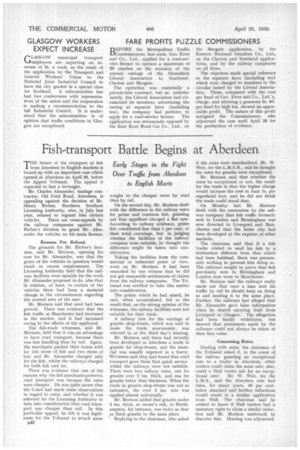Fish-transport Battle Begins at Aberdeen
Page 52

If you've noticed an error in this article please click here to report it so we can fix it.
Early Stages in the Fight Over Traffic from Aberdeen to English Marts
THE future of the transport of fish from Aberdeen to English markets is bound up with an important case which opened at Aberdeen on April 20, before the Appeal Tribunal. The appeal is expected to last a fortnight.
Mr. Charles Alexander, haulage Contractor, Old Ford Road, Aberdeen, is appealing against the decision of Mr. Henry Riches, Northern Scotland Licensing Authority, who, in July last year, refused to regrant him certain vehicles. There are cross-appeals by the railway companies against Mr. Riches's decision to grant Mr. Alexander the vehicles on his main licence.
Reasons For Refusal.
The grounds for Mr. Riches's decision, said Mr. Morison, opening his case for Mr. Alexander, was that the grant of the vehicles in question would result in excess requirements. The Licensing Authority held that the rail" way facilities were suitable for the work Mr. Alexander proposed to do, also that relation, at least, to certain of the vehicles there had been a material change in the circumstances regarding the normal area of the user.
Mr. Morison said that need had been proved. There was evidence that the fish traffic at Manchester had increased in the market, and it had increased owing to the efforts of the applicant.
The fish-trade witnesses, said Mr. Morison, held that it was an advantage to have road transport, because there was less handling than by rail. Again, the merchants packed their boxes with ice (six stone of fish and two stone of ' ice) and Mr. Alexander charged only for the fish, whilst the railways charged for both fish and ice.
There was evidence that one of the reasons why the fish merchants preferree road transport was because the rates were cheaper. He was quite aware that the Court bad made some observations in regard to rates, and whether it was relevant for the Licensing Authority to • take into consideration that road transport was cheaper than rail. In this particular appeal, he felt it was legitimate for the Tribunal to attach some
B42 weight to the cheaper rates by road than by rail.
On the second day, Mr. Morison dealt with the difference in the railway rates for prime and common fish, pointing out that appellant charged a flat rate. According to railway evidence, prime fish constituted less than I per cent. ot their total carryings, but, in judging whether the facilities of the railway company were suitable, he thought the difference might be taken into consideration.
Taking the facilities from the commercial or industrial point of view, went an Mr. Morison, it had been remarked by one witness that he did not get reasonable settlements of claims from the railway companies. The Tribunal was entitled to take this matter into consideration.
The points which he had raised, he said, when accumulated, led to the result that, on the strong opinion of the witnesses, the railway facilities were not suitable for their trade, A railway rate for the carriage of granite shop-fronts, which was said to make the trade uneconomic, was referred to at the third day's hearing.
Mr. Morison said there had recently been developed in Aberdeen a trade in granite for shop-fronts, and the material was usually required in a hurry. Witnesses said they had found that road transport gave them that quick service whilst the railways were not suitable. There were two railway rates, one for granite over 2 ins, thick, and one for granite below that thickness. When the trade in granite shop-fronts was not so extensive, the over 2 ins, rate was applied almost universally.
Mr. Morison added that granite under 2 ins, thick, at owner's risk, to Northampton, for instance, was twice as dear as thick granite to the same place.
Replying to the chairman, who asked if the rates were standardized, Mr, W. Weir, for the L.M.S.R., said he thought the rates for granite were exceptional.
Mr. Morison said that whether the rates be exceptional or not, the result for the trade is that the higher charge would increase the cost at least Is. per superficial foot, and he did not think the trade could stand that.
On Monday last Mr. Morison dealt with the contention by the railway company that fish traffic formerly sent to London and Birmingham was now diverted to Liverpool and Manchester and that the latter city had been developed at the expense of other markets.
The chairman said that if a fish trader wished to send his fish to a destination different from that which had been habitual, there was presumably nothing to prevent him doing so. The railways sought to prove that fish previously sent to Birmingham and London now went to Manchester.
Mr. Morison said the railways really made out that once a man sent his traffic by rail he should keep on doing so and sending it to the same place. Further, the railways had alleged that Mr. Alexander gave false information when he denied carrying fruit from Liverpool to Glasgow. The allegation had been finally withdrawn, but showed that statements made by the railways could not always be taken at their face value.
Concerning Rates.
Dealing with rates, the chairman of the Tribunal asked if, in the event of the "railway granting an exceptional rate to a trader in Aberdeen, other traders could claim the same rate; also, could i Hull trader ask for an excep
tional rate? Mr. WI. Weir, for the L.M.S., said the Aberdeen rate had been, for many years, 40 per cent. below standard and further reductions would result in a similar application from Hull. The chairman said he wished to know if Hull traders had a statutory right to claim a similar reduction and Mr. Morison undertook to cliscoVer this. Hearing was adjourned.






















































































